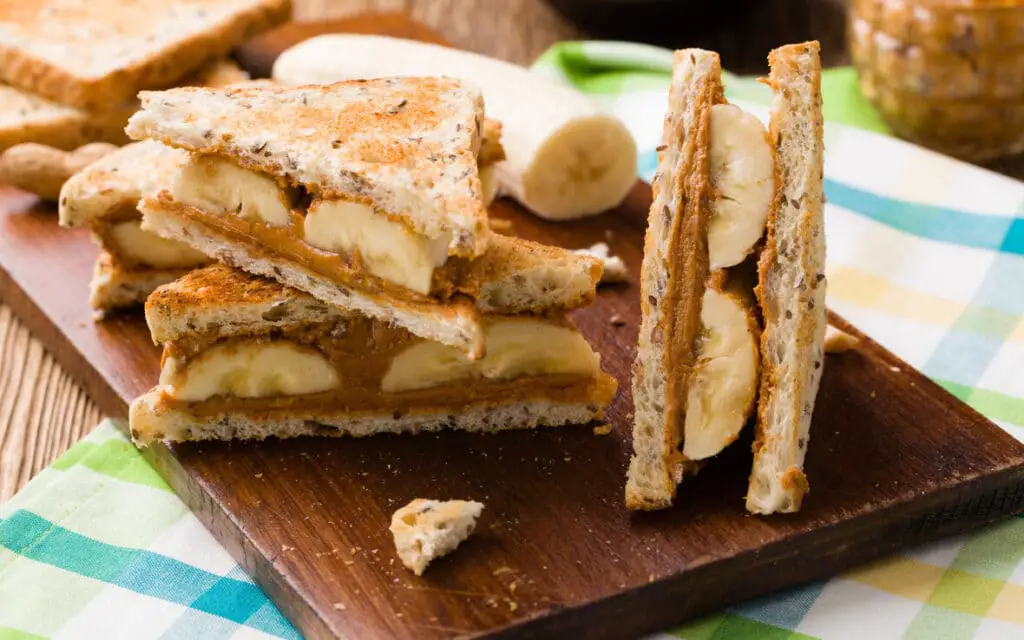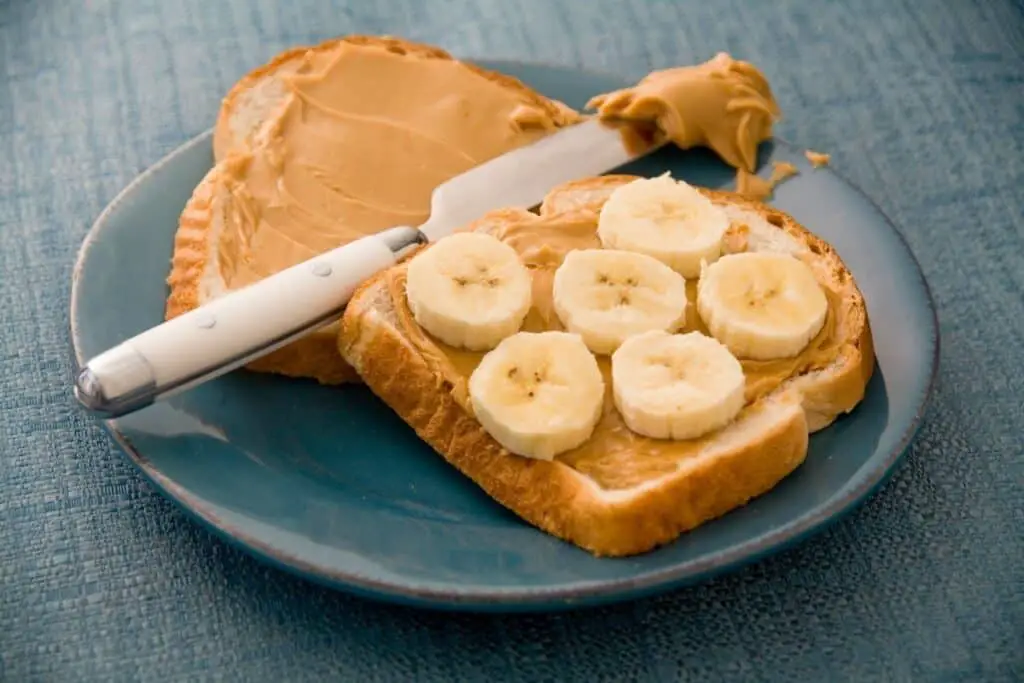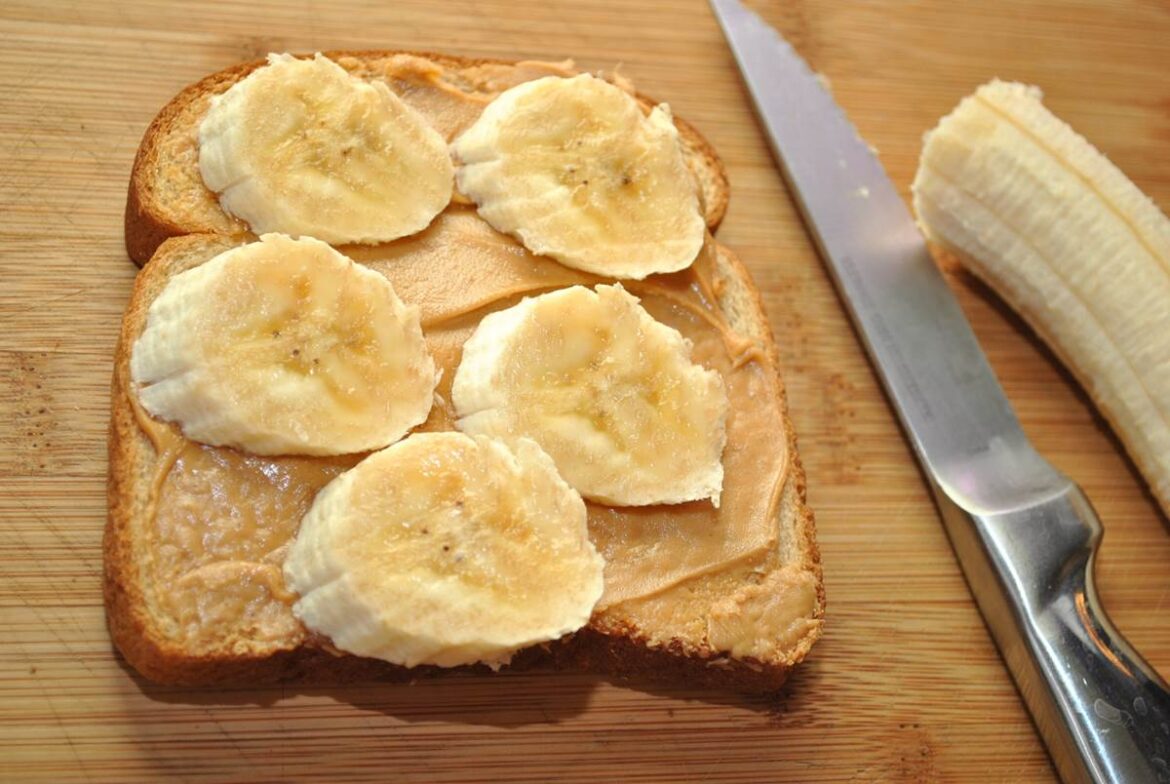Introduction
Is Peanut Butter And Banana Sandwich Good For Weight Loss: It might seem counterintuitive to consider a peanut butter and banana sandwich as a weight loss-friendly option. After all, peanut butter is calorie-dense, and bananas are known for their natural sugars. However, beneath the surface lies a wealth of nutrients that can actually support a weight loss regimen. Peanut butter is a source of healthy fats and protein, both of which are essential for satiety and energy. These fats can help keep you full, reducing the temptation to snack on less nutritious options. Additionally, the protein content aids in muscle maintenance and recovery during weight loss.
Bananas, on the other hand, provide essential vitamins and minerals, including potassium and fiber. Potassium can help regulate blood pressure and reduce water retention, while fiber promotes digestive health and provides a sense of fullness. The natural sugars in bananas offer a sweet satisfaction without the processed sugars found in many other snacks.
The key to making a peanut butter and banana sandwich a weight loss-friendly option lies in moderation and mindful choices. Opt for whole-grain or whole-wheat bread to increase fiber content and choose natural peanut butter with no added sugars or unhealthy fats. Portion control is crucial, as excessive consumption can quickly add up in calories.

Is banana and peanut butter good for weight loss?
The high amounts of fiber and fat in this snack can keep you full longer, which means you may eat less throughout the day. And that calorie deficit can lead to weight loss, if that’s your goal. And eating TOO MUCH can lead to weight gain.
Low in Calories: A medium-sized banana contains around 105 calories, making it a relatively low-calorie snack option.
Fiber-Rich: Bananas are a good source of dietary fiber, which aids in digestion, promotes satiety, and can help control appetite.
Natural Sugars: While bananas contain natural sugars, they also provide essential vitamins, minerals, and antioxidants. These nutrients help balance blood sugar levels and reduce cravings for unhealthy sugary snacks.
Potassium: Bananas are rich in potassium, which is crucial for maintaining proper muscle function and can help prevent muscle cramps during exercise.
Prebiotic Fiber: The prebiotic fiber in bananas supports a healthy gut microbiome, which can have a positive impact on weight management.
Protein: Peanut butter is a good source of plant-based protein, which helps build and repair muscle tissue. Protein also contributes to feelings of fullness, reducing overall calorie intake.
Healthy Fats: It contains monounsaturated and polyunsaturated fats, which can help curb hunger and promote weight loss when consumed in appropriate portions.
Fiber: Like bananas, peanut butter contains fiber, which aids digestion and keeps you feeling satisfied between meals.
Nutrients: Peanut butter is a source of various essential nutrients, including vitamin E, magnesium, and potassium.
Is a peanut butter sandwich okay for weight loss?
Good news, sandwich lovers — PB&J can definitely be part of a well-balanced diet, and could help with weight loss! Especially if you follow the healthy hacks mentioned above. The nutritional value of a PB&J does allow this sandwich to be a part of a well-balanced diet, and it may help with weight loss.
Protein: Peanut butter is a protein-rich food. Including protein in your diet can aid in maintaining lean muscle mass and promoting feelings of fullness, which can help control your appetite.
Healthy Fats: While peanut butter contains fats, most of them are monounsaturated and polyunsaturated fats, which are considered heart-healthy. These fats contribute to satiety and can be beneficial for weight management.
Fiber: Peanut butter is a source of dietary fiber, which aids in digestion and helps keep you feeling full for longer periods.
Nutrients: Peanut butter provides essential nutrients like vitamin E, magnesium, and potassium, contributing to overall health and well-being.
A peanut butter sandwich can be part of a balanced diet when you consider your overall daily calorie intake and nutrient needs. It’s crucial to incorporate a variety of foods and nutrients from fruits, vegetables, lean proteins, and whole grains to ensure your body receives the essential nutrients it requires for weight loss and overall health.
Is toast with peanut butter and banana good for weight loss?
She shares, “A combination of banana, peanut butter and whole-grain toast is a great snack because it provides protein, fiber-rich carbs and healthy fats, which helps keep your blood sugars stable, gives you energy and keeps you full.”
Protein: Peanut butter is a protein powerhouse, and including protein in your diet can promote feelings of fullness and help control your appetite.
Healthy Fats: The fats in peanut butter are mainly monounsaturated and polyunsaturated fats, which are heart-healthy and can aid in weight management by contributing to satiety.
Fiber: Peanut butter contains dietary fiber, which supports healthy digestion and helps you stay full for longer.
Nutrients: Peanut butter is a source of essential nutrients, including vitamin E, magnesium, and potassium, which are vital for overall health.
Low in Calories: A medium-sized banana contains roughly 105 calories, making it a relatively low-calorie snack option.
Fiber-Rich: Bananas are high in dietary fiber, which aids digestion, promotes satiety, and can help control your appetite.
Is it better to eat banana with peanut butter?
Nut butters contain tryptophan, an amino acid that gets turned into serotonin in the brain, and is a precursor to melatonin. Eaten together, the carbs from the banana can make tryptophan more available to your brain and increase your ability to sleep. “This treat is a sleep aid wonder,” she says.
Bananas
Low in Calories: A medium-sized banana contains approximately 105 calories, making it a reasonably low-calorie snack.
Rich in Fiber: Bananas are an excellent source of dietary fiber, which aids in digestion, promotes feelings of fullness, and helps regulate appetite.
Vitamins and Minerals: Bananas provide essential vitamins and minerals, such as potassium, vitamin C, and vitamin B6, which are crucial for overall health and well-being.
Natural Sugars: While bananas contain natural sugars, they also offer antioxidants and nutrients that can help balance blood sugar levels and reduce cravings for sugary treats.
Peanut Butter
Protein: Peanut butter is a valuable source of plant-based protein, which is essential for muscle maintenance and can promote satiety, helping you control your appetite.
Healthy Fats: Most of the fats in peanut butter are monounsaturated and polyunsaturated fats, which are considered heart-healthy and can support weight management by providing a sense of fullness.
Fiber: Peanut butter also contains dietary fiber, which aids digestion and contributes to prolonged feelings of fullness.
Essential Nutrients: Peanut butter offers nutrients like vitamin E, magnesium, and potassium, contributing to overall health.
Can I eat peanut butter while losing belly fat?
Peanut butter is a nutritious and tasty addition to any weight-loss diet as long as it is consumed in moderation.
Satiety: The combination of protein, healthy fats, and fiber in peanut butter can help you feel full and satisfied. This can reduce overall calorie intake and discourage overeating, contributing to weight loss, including belly fat.
Balanced Energy: The healthy fats in peanut butter provide a steady source of energy, preventing energy crashes and cravings for sugary, high-calorie snacks that can lead to weight gain.
Muscle Maintenance: The protein in peanut butter supports muscle maintenance, and having more muscle can increase your metabolism, helping you burn more calories, including those stored in the belly area.
Nutrient Density: Peanut butter offers a range of nutrients, making it a nutritious choice compared to empty-calorie snacks. When you make healthier choices, you’re more likely to create a calorie deficit, which is essential for fat loss.
What’s the banana trick for weight loss?
Banana trick weight loss is a popular term for a diet that involves eating bananas and drinking warm water in the morning. The diet claims to help you lose weight by boosting your metabolism, curbing your cravings, and improving your digestion.
Calorie Deficit is Key: Weight loss fundamentally comes down to creating a calorie deficit, which means consuming fewer calories than your body burns. While bananas are a nutritious food, eating them exclusively or at specific times won’t guarantee weight loss if your overall calorie intake remains too high.
Nutrient Variety: Restricting your diet to a single food, even a healthy one like bananas, can lead to nutrient deficiencies and is not considered a balanced or sustainable approach to weight loss.
Metabolism and Timing: While eating breakfast is many people, there’s no magic in consuming bananas during that meal that significantly boosts metabolism compared to other nutrient-rich foods. Metabolism is influenced by various factors, including genetics, muscle mass, and overall calorie intake.
Digestion: There’s no scientific evidence to suggest that eating bananas with hot water enhances digestion or fat burning more than consuming them with cold water or on their own. The human body is adept at digesting a wide range of foods under various conditions.
How much peanut butter can I eat a day for weight loss?
two tablespoons
Consuming not more than two tablespoons (or 32 grams) of peanut butter is recommended daily. Eating it in moderation with suitable exercise will help your weight loss journey. You must consult a dietitian to determine the best portion size for you.
Meal Timing: Spread your peanut butter consumption throughout the day rather than consuming it all at once. You might add a tablespoon to your morning oatmeal, use it as a dip for apple slices as a mid-morning snack, or include it in a post-workout smoothie.
Pair with Whole Foods: Combine peanut butter with fruits, vegetables, or whole grains to create balanced meals and snacks. For example, you can spread it on whole-grain bread or use it as a dip for carrot sticks.
Read Labels: When purchasing peanut butter, choose natural varieties with minimal added sugars or unhealthy additives. These options are generally healthier choices.
Track Your Intake: If you’re diligently tracking your calorie intake, use a food scale to measure your peanut butter portion accurately. This can help you stay within your calorie goals.
Can I eat banana and peanut butter for breakfast?
It’s nutritious. I start with whole-grain toast and then add natural peanut butter, a drizzle of honey and banana slices. These nutrient-dense foods pack a lot of good stuff into every bite. Peanut butter: Full of healthy fats, fiber and protein.
Satiety: The pairing of fiber from bananas and protein from peanut butter helps you feel full and satisfied, reducing the temptation to snack on less nutritious options later in the morning.
Steady Energy: The natural sugars in bananas provide a quick energy boost, while the protein and healthy fats in peanut butter help stabilize blood sugar levels, preventing energy crashes and sugar cravings.
Nutrient Variety: By combining these two foods, you get a wider array of nutrients, including vitamins, minerals, antioxidants, and beneficial fats, which can contribute to overall health and well-being.
Convenience: This breakfast option is quick and easy to prepare, making it a convenient choice for busy mornings.
Versatility: You can enjoy this combination in various ways – spread peanut butter on banana slices, make a banana and peanut butter sandwich, or blend them into a smoothie with other nutritious ingredients.

Conclusion
Peanut butter, despite being calorie-dense, contains healthy fats and protein, both of which play crucial roles in promoting satiety and maintaining muscle mass during weight loss. These nutrients help curb hunger and provide sustained energy throughout the day. Additionally, the presence of vitamins and minerals in peanut butter, such as vitamin E and magnesium, contributes to overall well-being.
Bananas, with their natural sugars, are a healthier alternative to processed sweets. They offer essential nutrients like potassium and fiber, which aid in regulating blood pressure, reducing water retention, and promoting digestive health. The fiber in bananas can make you feel full for longer periods, reducing the likelihood of unhealthy snacking. It’s essential to exercise caution and make wise choices when creating your peanut butter and banana sandwich. Opt for whole-grain or whole-wheat bread to increase fiber content and choose natural peanut butter without added sugars or unhealthy fats. Controlling portion sizes is crucial, as excessive consumption can easily lead to an unintended calorie surplus.
The peanut butter and banana sandwich should be viewed as just one element of a well-rounded, nutritious diet. It should complement a variety of other foods that provide a range of vitamins, minerals, and macronutrients. Incorporate fruits, vegetables, lean proteins, and whole grains into your daily meals for a balanced approach to weight loss.


3 comments
… [Trackback]
[…] Read More on that Topic: thefitnessblogger.com/is-peanut-butter-and-banana-sandwich-good-for-weight-loss/ […]
… [Trackback]
[…] Find More on on that Topic: thefitnessblogger.com/is-peanut-butter-and-banana-sandwich-good-for-weight-loss/ […]
… [Trackback]
[…] Read More Info here to that Topic: thefitnessblogger.com/is-peanut-butter-and-banana-sandwich-good-for-weight-loss/ […]